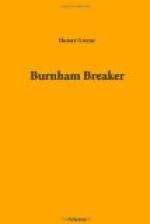“We do not think you do, either, as we understand the case. The prothonotary will endorse a simple return on the writ, setting forth the production of the boy, and you may sign it. We think that is all that will be necessary on your part. Now you may be seated.”
The judge turned to Sharpman.
“Well, Mr. Sharpman,” he said, “what have you to offer on the part of your client?”
Sharpman arose. “If the court please,” he responded, “I would respectfully ask to be allowed, at this juncture, to withdraw from the case. I prepared and presented the petition as a matter of duty to a client. I do not conceive it to be my duty to render any further assistance. That client, either through ignorance or deception, has been the means of placing me in a false and unenviable light before the court and before this community, in the suit which has just closed. I have neither the desire nor the opportunity to set myself right in that matter, but I do wish and I have fully determined to wash my hands of the whole affair. From this time forth I shall have nothing to do with it.”
Sharpman resumed his seat, while Craft stared at him in astonishment and with growing anger.
He could hardly believe that the man who had led him into this scheme, and whose unpardonable blunder had brought disaster on them both, was now not only deserting him, but heaping ignominy on his head. Every moment was adding to his bitterness and rage.
“Well, Mr. Craft,” said the judge, “what have you to offer in this matter? Your attorney seems to have left you to handle the case for yourself; we will hear you.”
“My attorney is a rascal,” said Craft, white with passion, as he arose. “His part and presence in that trial was a curse on it from the beginning. He wasn’t satisfied to ruin me, but he must now seek to disgrace me as well. He is—”
The judge interrupted him:—
“We do not care to hear your opinion of Mr. Sharpman; we have neither the time nor the disposition to listen to it. You caused this defendant to produce before us the body of the boy Ralph. They are both here; what further do you desire?”
“I desire to take the boy home with me. The judgment of this court is that he is my grandson. In the absence of other persons legally entitled to take charge of him, I claim that right. I ask the court to order him into my custody.”
The old man resumed his seat, and immediately fell into his customary fit of coughing.
When he had recovered, the judge, who had in the meantime been writing rapidly, said:—




